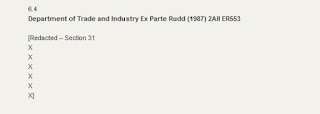Available at What Do They Know? and elsewhere are redacted
copies of the BBC provided TV Licensing™
Court Presenters' Manual.
As is often the case, a fearful, secretive BBC, oblivious
to the realities of the internet and easy access to information from other
sources, has redacted some of the most useful bits of information within that
document in a rather comedic and futile attempt to keep it secret. A fearful, secretive BBC, try to keep these things
secret but people just can’t help finding things out. What an inconvenient
curse the internet and alternative media have proven to be for the BBC and its
BBC TV Licensing™ administration and enforcement contractor Capita. In particular, we note that the BBC censors have
removed all mention of the successful House of Lords Appeal in the case of Rudd
vs The Secretary of State for Trade and Industry.
In that Appeal, heard in 1987, brought by a defendant,
Jeffrey Rudd, who was accused and convicted of an offence contrary to section 1 of
the Wireless Telegraphy Act 1949, namely, that he was using equipment for the
purposes of wireless telegraphy without a licence granted by the Secretary of
State.
Even though the judgement is now over 30 years old, it is
still relevant to this today because the TV licence sections of the
Communications Act 2003 are derived from that Wireless Telegraphy Act. The BBC
and its BBC TV Licensing™ contractor Capita are fearful of the legal precedent
set and consequent loss of easy revenue streams created by the Rudd judgement, which is why it has been airbrushed from the TV
Licensing™ Court Presenters' Manual.
A summary of the Rudd judgment can be read here, but cutting through the legalese it boils down to
this significant fact: For a defendant to be guilty of TV licence fee evasion, a Capita court presenter must prove that a television receiver or other
devices were actually used, and not merely that they were unlicensed
audio-visual equipment or other devices available for use.
This means that unlicensed possession of a television
receiver, audio-visual equipment or other device is not an offence, unless it
is actually used as a television receiver.
Lord Goff of Chieveley stated:
"There may
well be circumstances in which, for example, a television set may be available
for use in a person's house, and yet he may have no intention to use it and so
may not license it. Thus he may be about to go away from home at the time when
the licence expires, and not intend to renew the licence until he returns home.
It is difficult to see why in such circumstances he should be convicted for an
offence under section 11 (of the 1949 Act) on the ground only that the set was
available for use and unlicensed..."
He continued:
"I recognise
that this conclusion may create problems for the enforcing authorities in so
far as it means that they cannot simply rely upon the fact that the relevant
apparatus was available for use. They will, I fear, have to go further and will
if necessary have to persuade the court to draw the inference that the apparatus
in question was used by the defendant during the relevant period. But I trust
and believe that if, for example, a television set in working order is found in
the sitting room of a house occupied by the defendant, it will not be difficult
for a court to draw the necessary inference in the absence of some credible
explanation by the defendant to the effect that it was not being used."
It therefore follows that BBC TV Licensing™ contractor
Capita’s court presenter has a weak case unless a person at an unlicensed
address was actually seen in the act of receiving TV programmes without a valid
TV licence.
Anyone caught with a TV receiver, audio-visual equipment
or other device in unlicensed premises could offer the perfectly valid defence
that it wasn't in use, but was present for some non-licensable purpose, for
example, listening to radio, playing video games, watching DVDs and videos or
use for CCTV monitoring.
Remember that BBC TV Licensing™ contractor Capita’s target
driven, Code 8 obsessed dross have no automatic right of entry to any property.
You can avoid the risk of having to rely on the Rudd defence by ignoring BBC TV
Licensing™ contractor Capita completely. In fact, there is every reason to and it
is in your own interests to do so. Tell
them nothing and never allow them access to your home.
The value
of domestic cctv surveillance and handheld video camera can prove invaluable in
gathering evidence of the serial abuses and misdemeanours perpetrated by
employees of Capita Business Services under cover of the BBC TV Licensing™
contract. TV Licensing Watch advise anybody who has the misfortune to have face
to face dealings with Capita BBC TV Licensing™ to make an audio-visual record
of those dealings in their entirety covertly or overtly with cctv and handheld
video cameras.






No comments:
Post a Comment